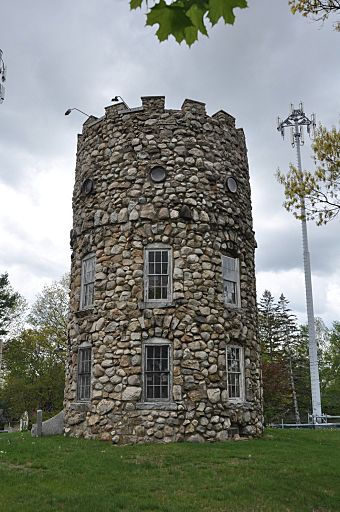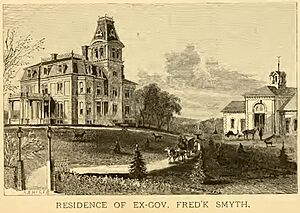Smyth Tower facts for kids
Quick facts for kids |
|
|
Smyth Tower
|
|
 |
|
| Location | 718 Smyth Rd., Manchester, New Hampshire |
|---|---|
| Area | 0.5 acres (0.20 ha) |
| Built | 1888 |
| NRHP reference No. | 78000215 |
| Added to NRHP | July 24, 1978 |
The Smyth Tower is a unique stone tower in Manchester, New Hampshire. It stands on the grounds of the Manchester VA Medical Center. This tower was built in 1888 by Frederick Smyth. He was a former Governor of New Hampshire. The tower is special because it's the only building left that shows his architectural ideas. It's also listed on the National Register of Historic Places. This means it's an important historical site in the United States.
About the Smyth Tower
The Smyth Tower is located in eastern Manchester. It stands on the west side of the VA facility. This stone tower is about 40 feet (12 meters) tall. Its walls are very thick, about 2 feet (0.6 meters) wide. The tower was built using local fieldstone. It has a round shape, about 28 feet (8.5 meters) across. Inside, there's a basement level and three main floors. The top of the tower has a special design called a crenellated parapet. This looks like the top of an old castle wall.
Frederick Smyth built this tower in 1888. He owned a very large piece of land. Part of that land is now where the VA facility is. Smyth built the tower to look like one he saw in Scotland. He placed it on land he bought early in Manchester. His large country house, "The Willows," is no longer standing.
Frederick Smyth's Legacy
Frederick Smyth was an important person in New Hampshire. He served as the Governor from 1865 to 1867. After the American Civil War, he worked hard to help soldiers who had returned home. He supported creating special homes for these veterans. He also helped start what is now the University of New Hampshire.
The Tower's Many Uses
Smyth's widow gave the tower to the city in 1938. Soon after, workers from the Works Progress Administration (WPA) fixed it up. The WPA was a program that created jobs during the Great Depression. They prepared the tower to be an amateur radio station. This station could provide emergency communication for the city. Its call sign was W1LVK.
During World War II, the tower continued to house radio equipment. It helped with important communications. Later, when the VA facility was being built, the tower was used as an office. At one point, there were plans to tear it down. But Smyth's family stepped in and saved it. Thanks to them, this historic tower is still standing today.
 | James B. Knighten |
 | Azellia White |
 | Willa Brown |




